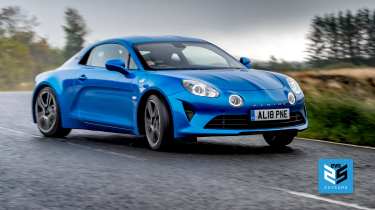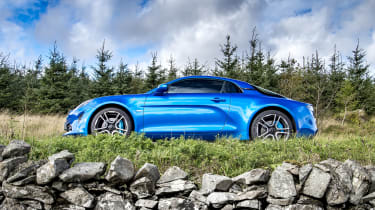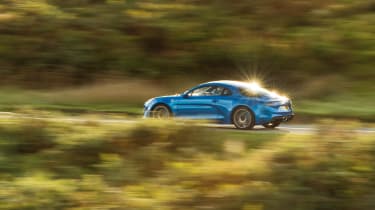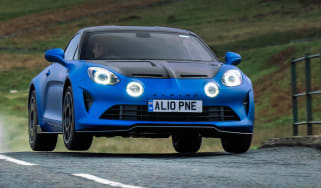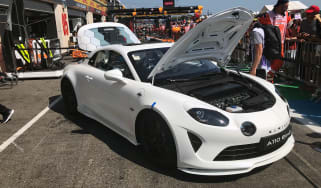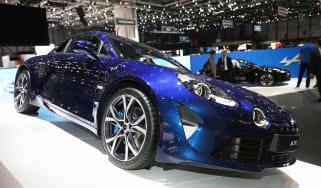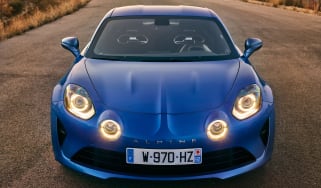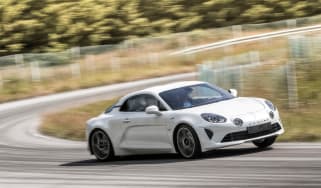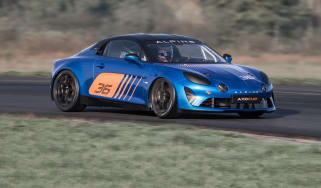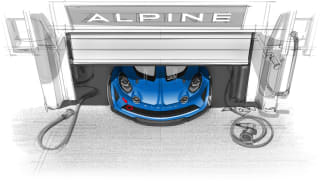Alpine A110 review – distinctive, lightweight and unforgettable to drive
The A110 is a lightweight sports car of the kind we might never see again, and a deeply compelling alternative to Porsche's 718 Cayman
The Alpine A110 has been a fixture in the sports car class for a few years now, having transcended its troubled birth to become a new standard of excellence thanks in large part to its lightness, deftness and satisfying fluidity. There have been other lightweight, aluminium-intensive, mid-engined sports cars during the last 25 years. The 21st-century Alpine A110 is not a revolutionary car. But it is a brilliant one – and a significant one in that its existence at all is a bit of a miracle, making it one of our top 25 cars of the last 25 years.
Born from an initial collaboration between Renault and Caterham (then owned by Tony Fernandes) 11 years ago, and driven by the enthusiasm of then Renault COO Carlos Tavares, the reborn A110 was besieged with setbacks before it could turn a wheel: the partnership with Caterham ended predominantly because the latter didn’t have enough money to continue with the project; Renault went it alone but when Tavares left the company (now heading up Stellantis, via PSA Group), CEO Carlos Ghosn (now reportedly in Lebanon, reputedly via a double-bass case) was widely considered to be rather less emotionally attached to the project. Nonetheless it made production, perhaps because it would have cost more money to cancel than conclude it by that stage, only for an early car to burn to the ground during filming for Top Gear, requiring a last-minute internal investigation to analyse and fix the problem.
Somehow, the A110 made it into the world – and reminded us just how special a small, lightweight, thoughtfully designed car that matches power to weight and grip can be. ‘I give a massive tip of the hat to Caterham [for the A110’s engineering fundamentals], and when I do that I’m automatically giving it to Lotus,’ chief engineer David Twohig (who took on the A110 in 2014) told evo – many of the British engineers on the project came from Lotus, as did much of the car’s philosophy.
More reviews
The automotive press eulogised the car – difficult not to once you’ve driven one – and thus inflicted the motoring journalist’s curse upon it: great reviews, disappointing sales. That said, they have steadily increased – according to Car Industry Analysis by 34 per cent in 2022, to 3600 cars worldwide – perhaps as the possibility of another small, lightweight, semi-affordable sports car being released in the future looks increasingly unlikely.
It was also nominated for European Car of the Year 2019, an unusual feat for a two-seater sports car. And Gordon Murray has one as a daily driver, it being the first car he could find to satisfactorily replace his Smart Roadster, and has benchmarked its ride and handling for the T.50.
And the A110’s ride, handling and overall feel are sublime: just enough power, just enough performance, not too much weight and not too much grip or suspension stiffness (in standard, base specification, at least: other versions add poke to the 1.8-litre turbo engine shared with the Mégane RS, and aggression to the suspension, but for many the base car is the most charming driving experience).
Yes, it would be nice if it had a manual gearbox and a more characterful engine, but no matter: it’s a magical car. And one akin to a ’60s sports car not only in the way it looks, but the way it drives too. It’s a modern classic in every sense of the term, and one that has shone in evo group tests over the years. The base car was runner-up at our 2018 Car of the Year test, while the A110 R was second only to the Porsche 911 GT3 RS at eCoty 2023. The most extreme A110 was also a standout performer at Track Car of the Year 2024, where a circuit-oriented suspension tune gave it fantastic ability and precision. Just like another all-time great sports car, the Porsche 911, the A110 has proved to be as flexible and wide reaching as it is brilliant to drive.
Alpine A110: in detail
- Engine, gearbox and technical highlights - Four-cylinder unit is sweet-revving and eager, and the twin-clutch transmission has sharpened up
- Performance and 0-62mph time - Low weight philosophy and short gearing means the rasping turbo four delivers strong straight-line punch. It's smooth and responsive too
- Ride and handling - Alpine follows Lotus’s lead by combining supple ride with agility. It gives the car a distinctive feel, but can feel scrappy at the limit
- MPG and running costs - Low weight pays dividends at the pumps, the Alpine getting close to its official figures on a run. Also means less wear and tear on consumables
- Interior and tech - Material and build quality is generally good, if not exceptional, but the A110's technology lags behind that of Porsche and BMW
- Design - No matter which way you look at it, the compact and retro-infused A110 looks stunning. A thoroughly modern design, but those in the know will spot the retro cues
Price, specs and rivals
A110 prices have gently been rising over the years, but not quite to the extent of its rivals, making it look like something of a low-key bargain in 2024. The base model starts at £54,490 – an impressive price considering the amount of bespoke engineering that’s gone into the project. The more powerful Porsche 718 Cayman is a little cheaper at £53,800, but throw in a PDK transmission and it's the more expensive car.
Prices quickly rise from there for more powerful versions (or to the stratosphere in the case of the A110 R). The A110 GT and A110 S models start from £65,490 and £67,490 respectively, which is in the ballpark of the 718 Cayman S's £63,800 list price. The 345bhp Porsche has a healthy power advantage over the two (admittedly lighter) 296bhp A110 models, but there is one thing to consider when comparing Alpines to Porsches: the 718’s prices need to rise more than a little to match the Alpine spec for spec.
Then there's the A110 R, which thanks to its extensive use of carbonfibre, adjustable suspension hardware and extreme aero costs an eye-watering £91,490. That's a huge sum, especially when you consider that the R offers the same 296bhp as the A110 S and GT, but the R used to be even more expensive (pricey carbonfibre wheels initially came as standard but no longer do).
As a complete sports car the Cayman just edges the Alpine for all round appeal. Yes, the flat-four engines are a bone of contention, and their character and delivery aren’t as effervescent as the Alpine’s four-pots, but they hit harder and come with more resolved transmissions; in terms of performance this punchy powerplant is a definite step up.
> Alpine A110 v Porsche 718 Cayman S v Audi TT RS – Supertest review
Competing with the Alpine for style, if not ability, is the now-axed Audi TT RS. Powered by the exceptional 394bhp turbocharged five-cylinder engine paired to Audi’s own dual-clutch ’box, it’s almost worth the price of admission on its own. Sadly, the chassis isn’t quite in the same league – it’s neither as agile as the Alpine’s (or Cayman’s), nor as supple.
Also from Germany, the BMW M2 presents a stern test for the more dainty, lightweight Alpine. It's less cosseting but more muscular, and the M2 offers the supreme precision and indulgent chassis balance we love in the M3 and M4, only with stubbier dimensions and more agility. It's character is completely distinct from the Alpine's, although it's one that the A110 must beat for sheer thrills and engagement. While we’re here, hot hatchback options such as the Audi RS3, Mercedes-AMG A45 S and the brilliant FL5-generation Honda Civic Type R also float around the A110’s entry price.
The Alpine is by no means poorly equipped for its outlay. One shouldn’t sniff at a low-volume, specially developed aluminium chassis with double wishbones at each corner for a start, but the company does understand that under-the-skin stuff only goes so far. Even in basic form trim you get LED headlights and tail lamps, 17-inch alloy wheels, lightweight (and gorgeous) Sabelt one-piece bucket seats, selectable driving modes and a 7-inch touchscreen infotainment set-up. GT models use the same suspension setup but with uprated brakes and a sports exhaust system, with front and rear parking sensors and a rear-view camera, 18-inch wheels, a full leather interior, six-way adjustable seats, and a Focal audio system thrown in to boot.
The S receives further Alcantara-esque Dinamica fabric inside as well as a stiffer chassis setup, with the A110 R going a whole lot further with a host of motorsport-inspired upgrades. These include new aero parts and adjustable suspension components, along with a carbon roof, engine cover and one-piece carbon seats. Standard Michelin Cup 2 tyres make the most of the mechanical enhancements; in the dry at least...
